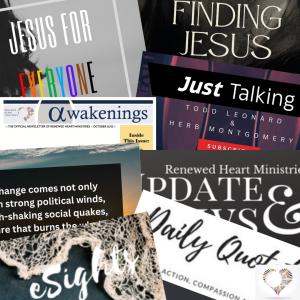
Let’s wrap up our series on a socially engaged gospel. All of this leads to us also defining salvation socially not merely individually. As Walter Rauschenbusch so rightly stated almost a century ago, “If our theology is silent on social salvation, we compel [people] to chose between an unsocial system of theology and an irreligious system of social salvation” (A Theology for the Social Gospel, p. 7) This social salvation can lead us into some beautifully inclusive realizations and practices. As the Rev. Dr. Jacqui Lewis so beautifully states, “If there is such a thing as salvation, none of us are saved, until all of us are saved.”
Welcome Readers! Please subscribe to Social Jesus Here.
(Read this series from the beginning at Part 1 and Part 2.)
“Perish” can refer not to some post mortem hell, but to literally perishing here, now, today. As Gustavo Gutierrez often stated, poverty is death and means an early death. Eternal life can be about quality not quantity: about the abundant life now, where there is enough for everyone to thrive (cf. John 10:10) .This vision is for a world that prioritizes making sure everyone is taken care of rather than shaping the world with greed and funneling our resources into the hands of the few in positions of power.
Today, we can lean into this passage: God actually does loves the world! And if God’s love is universal, then we are to care about justice for everyone included in that world as the objects of that love. As Rev. Dr. Emilie Townes says, “When you begin with the idea that God loves everyone, justice isn’t very far behind.” Or as so many today are fond of saying, “Justice is what love looks like in public.” This world that is loved, we must be careful to define as everyone, with no exclusions. Those who comprise our world that are loved includes those that are different from ourselves, even those whose differences trigger our own bigotries and prejudices. We must be honest here.
I’m thinking of how women in positions of authority can trigger insecure or patriarchal men. I’m thinking of how racial and cultural differences trigger those whose internal bias is some form of White or western supremacy. I think of how trans and nonbinary differences and gender nonconformity triggers those who have cis-biases. Or how folks who identify as gay, lesbian or bisexual trigger those with heteronormative biases. I think of class bias. I think of educational bias with what is now being called the paper ceiling.
If we are serious about leaning into the belief that every person is the object of divine love, then this would radically impact how we relate to those around us. Every person we meet is our sibling. Every person we meet is a part of ourselves. What impacts and affects one affects us all. Whether we like it or not, we are all connected to each other as part of this beautifully diverse human family that is loved by a universal love.
And this has grave implication for our everyday choices as well. You can’t love others and not care about the things they suffer from the way our society is shaped. You can’t love them and vote for legislatures who seek to do them harm. To come full circle, you can’t love them and be focused on only your own arrival into heaven or your own personal relationship with the Divine. Otherwise, our focus on God’s love mutates from God’s loving us alongside everyone else in the world into a self-absorbed need to be loved by God above all else. It’s an only-child-like syndrome where God may love others, but privately and inwardly we begin to believe that we are God’s favorite. This is the root of Christian and too often national exceptionalism.
To authentically reinterpret our passage this week through the lens of the Jesus we see in the Mark, Matthew, and Luke can still give us assurance of heaven, and still usher us into a relationship with the divine if that is your thing. And it also has the potential, when understood more broadly and deeply, to shape our practice of Christianity in ways that shape us into humans who make our world a safer, more compassionate, just home for everyone.
Are you getting all of RHM’s free resources each week?
Begin each day being inspired toward love, compassion, action, and justice. Free
Sign-Up at:
https://renewedheartministries.com/















